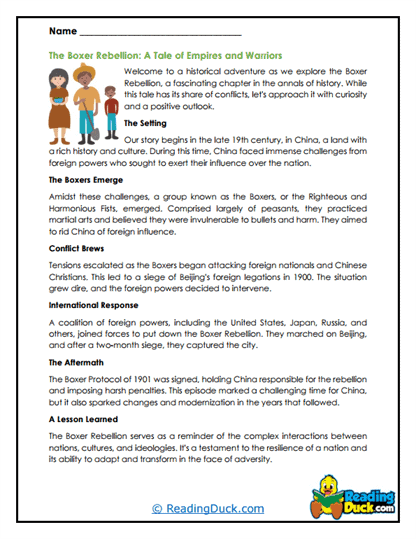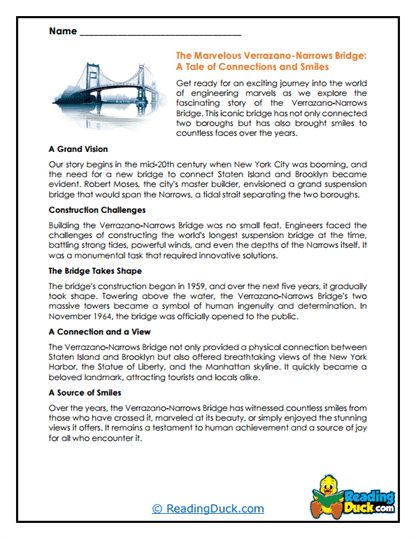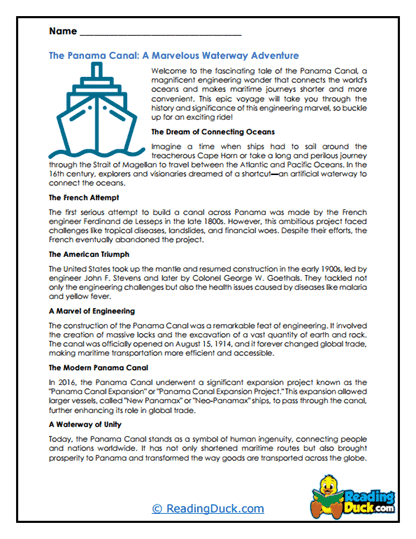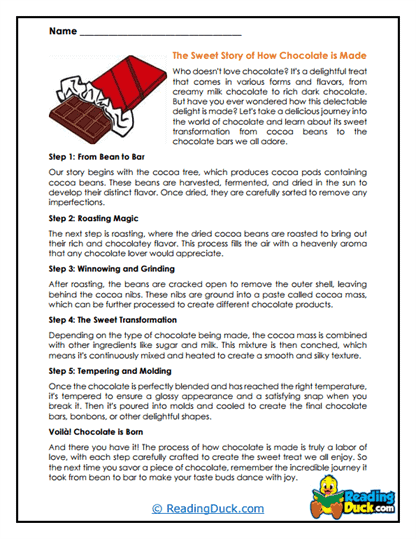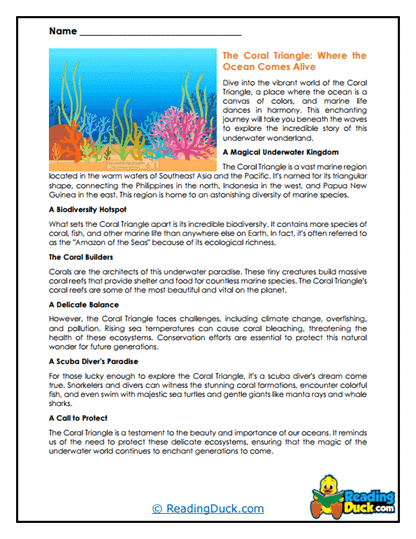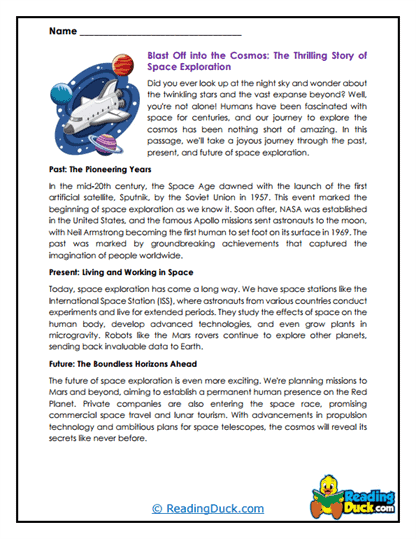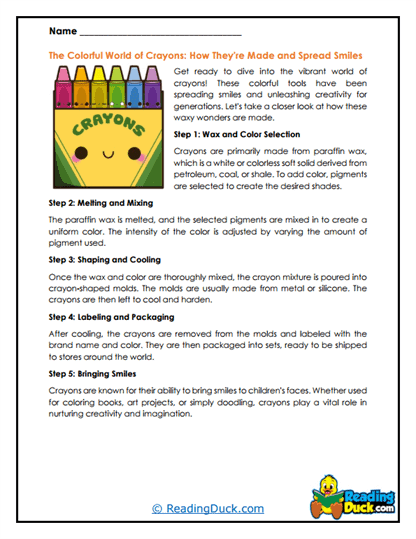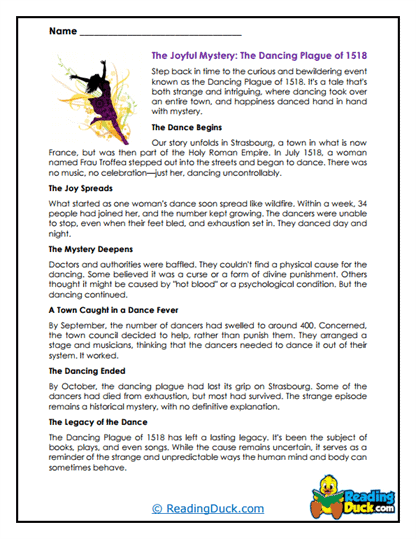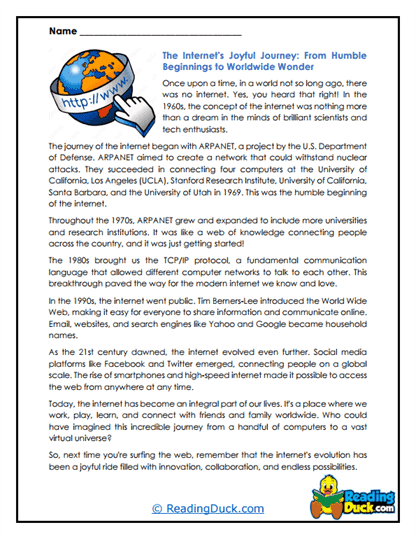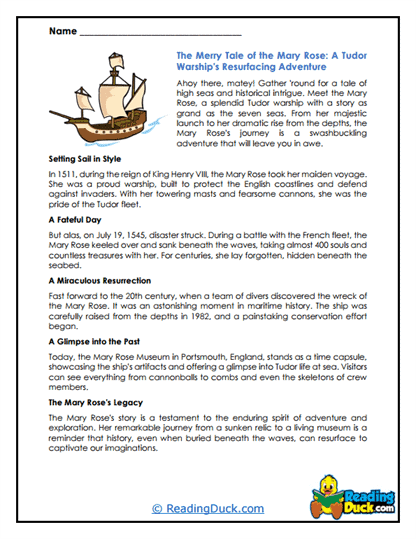Informational Passages with Questions Worksheets
About Our Informational Passages with Questions Worksheets
Our Informational Passages with Questions Worksheets collection provides students with engaging nonfiction reading materials designed to improve their comprehension and critical thinking skills. Each worksheet set contains a well-curated informational passage on a range of topics, followed by a series of multiple-choice, short-answer, and open-ended response questions. These worksheets help students practice extracting key information, understanding complex texts, and responding thoughtfully to what they’ve read.
Available in PDF format, these worksheets are easy to download, view, and print, making them ideal for use in classrooms, homework assignments, or independent study. The downloadable answer keys allow teachers to quickly assess student performance and provide targeted feedback. This collection offers an invaluable resource for enhancing students’ understanding of nonfiction content, boosting their reading skills, and preparing them for higher-level academic tasks.
Understanding the Informational Nonfiction Genre
Informational nonfiction is a genre focused on delivering factual, accurate, and objective information about a wide array of topics, ranging from science and technology to history, current events, and more. The goal of informational passages is to inform and educate readers, providing them with reliable knowledge and insights into specific subjects. Unlike narrative nonfiction, which tells a story, or persuasive nonfiction, which aims to convince, informational nonfiction is centered on presenting facts in a clear, structured manner.
Key themes and characteristics of the informational nonfiction genre include:
- Objectivity and clarity: The text presents information without personal bias, focusing purely on delivering facts and explanations.
- Well-organized structure: Information is often presented using headings, subheadings, lists, and bullet points, making it easy for readers to follow the logical flow of ideas.
- Evidence and data: Informational passages rely on verified data, statistics, and facts to support the material being discussed.
- Variety of topics: This genre covers a wide range of subjects, from natural sciences and social studies to health, technology, and current events.
Studying informational nonfiction is critical for students as it allows them to build a solid foundation of factual knowledge while enhancing their ability to analyze and interpret nonfiction texts. By working through our Informational Passages with Questions Worksheets, students develop essential skills for understanding complex information, organizing ideas, and recognizing key points within a text. Additionally, this genre is particularly important for fostering an informed, critical mindset that helps students engage with real-world issues and make informed decisions.
The worksheets in this collection not only enhance reading comprehension but also challenge students to think critically about the information presented. This helps them draw connections between what they’re reading and broader societal or scientific topics, improving both their academic and personal growth.
How Informational Passages Worksheets Develop Key Skills
Our Informational Passages with Questions Worksheets are specifically designed to develop a wide range of critical skills that benefit students across various academic disciplines. Engaging with informational nonfiction helps students hone their analytical abilities, comprehension skills, and logical reasoning, all of which are vital for success in both school and life.
Here are some of the key skills students develop through these worksheets:
- Reading comprehension: The multiple-choice and short-answer questions guide students in identifying main ideas, supporting details, and understanding the structure of informational texts.
- Critical thinking: Students are encouraged to think critically about the information they read by analyzing the credibility of sources, understanding cause-and-effect relationships, and making inferences.
- Information synthesis: The open-ended response questions ask students to summarize the information and present it in their own words, which strengthens their ability to synthesize and communicate complex ideas.
- Textual analysis: By breaking down the informational passage into key components (thesis, evidence, conclusions), students learn how to engage deeply with nonfiction writing and analyze the effectiveness of the material.
Compared to other genres like Persuasive Essays or Historical Nonfiction, informational passages require students to focus solely on factual accuracy and logical presentation. This allows them to practice skills such as evaluating evidence and organizing information systematically. For example, students might read a passage on climate change, where they must not only understand the scientific data presented but also consider how the information is structured to best communicate the message.
Additionally, the worksheets encourage students to apply knowledge from the passage to their own experiences or academic subjects, prompting them to think beyond the text and form broader connections. Whether the passage is about health, history, or technology, students are prompted to reflect on the significance of the information and how it impacts the world around them.
Building Vocabulary in the Context of Informational Nonfiction
A critical aspect of understanding informational nonfiction is mastering the genre-specific vocabulary that appears within these texts. Informational passages often contain specialized language and terms relevant to the subject matter, making vocabulary development a key component of improving reading fluency and comprehension.
Our Informational Passages with Questions Worksheets provide targeted opportunities for students to expand their subject-specific vocabulary and gain a deeper understanding of the language used in nonfiction writing. Key vocabulary terms are introduced within the context of the passage, and students are guided through exercises to help them understand and use these words effectively.
Some examples of the types of vocabulary students might encounter include:
- Technical terms: In scientific or technological passages, students may learn words related to the specific topic being discussed, such as “photosynthesis” or “infrastructure.”
- Academic language: Informational texts often include language used to explain, describe, or clarify ideas, such as “analyze,” “interpret,” “evaluate,” and “synthesize.”
- Topic-specific terminology: Depending on the subject of the passage, students may encounter vocabulary related to history, geography, economics, or other fields, enriching their understanding of each topic.
By engaging with these vocabulary-building exercises, students not only learn to recognize new words but also become adept at using them in context. The worksheets often include definition-based questions, sentence-building activities, and prompts that require students to explain terms in their own words, solidifying their grasp of the material.
Mastering this vocabulary is essential for improving overall reading fluency, as it enables students to navigate nonfiction texts more effectively. It also prepares them to engage with more advanced materials in academic subjects such as science, history, and social studies, where precise language and technical terminology are key.
Encouraging Cross-Curricular Integration with Informational Passages
Our Informational Passages with Questions Worksheets serve as an excellent tool for fostering cross-curricular connections, allowing students to apply their nonfiction reading skills across a range of academic disciplines. Informational nonfiction covers a diverse array of topics, making it a versatile resource for integrating into subjects such as science, history, geography, and social studies.
Examples of how these worksheets can be used in a cross-curricular context include:
- Science: Informational passages on topics like environmental science, human anatomy, or space exploration can help students better understand the scientific principles behind real-world phenomena.
- History: Passages focused on historical events, civilizations, or movements allow students to connect their nonfiction reading skills with their knowledge of world history.
- Geography: Informational texts that explore geographical concepts, such as the impact of natural disasters or the formation of ecosystems, provide students with a more comprehensive understanding of the physical world.
- Social studies: Passages that discuss government systems, cultural practices, or economic trends help students see how nonfiction texts reflect the structures and dynamics of society.
By connecting informational nonfiction to different academic subjects, students gain a more holistic understanding of how the skills they develop through reading and analyzing nonfiction passages apply to their broader educational journey. This approach also encourages students to view nonfiction reading as an essential tool for learning in various disciplines, not just as an isolated language arts activity.
Strengthening Comprehension and Analytical Skills
The Informational Passages with Questions Worksheets are designed to help students build and refine their reading comprehension strategies while engaging with complex nonfiction texts. Informational nonfiction often presents dense and detailed content, requiring students to apply different reading strategies to fully understand the material.
The worksheets are structured to improve students’ ability to:
- Identify main ideas and supporting details: Multiple-choice questions help students pinpoint the most important information in the passage, such as the author’s main point, supporting facts, and key examples.
- Analyze structure and organization: Short-answer prompts encourage students to explain how the passage is organized and why the author has chosen a particular structure to present the information.
- Draw inferences and make connections: Open-ended questions challenge students to think beyond the text, make connections between the passage and their own knowledge, and infer the implications of the information presented.
- Evaluate arguments and evidence: Some passages may present data or arguments, prompting students to assess the credibility and strength of the evidence provided.
By working through these activities, students enhance their ability to critically engage with nonfiction texts, evaluate the reliability of sources, and form well-reasoned conclusions. These skills are essential for academic success and for navigating the vast amount of information students encounter in their daily lives, from textbooks to media reports and beyond.
Conclusion
Our Informational Passages with Questions Worksheets offer a structured, engaging way for students to improve their nonfiction reading comprehension, critical thinking, and analytical skills. Through a diverse selection of passages covering a wide range of topics, students are challenged to think deeply about the material, reflect on key ideas, and draw connections to real-world issues. With a strong emphasis on vocabulary building and cross-curricular connections, these worksheets provide a valuable resource for any educator looking to enhance their students’ understanding of informational nonfiction and prepare them for success across multiple academic disciplines.
